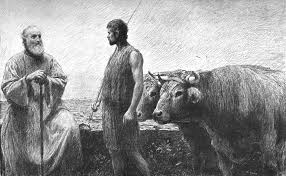We are but unworthy servants
Mount Calvary Church
A Roman Catholic Parish
The Personal Ordinariate of S. Peter
Eutaw Street and Madison Avenue
Baltimore, Maryland
Sunday, October 6, 2019
Trinity XVI
Rev. Albert Scharbach, Pastor
Dr. Allen Buskirk, Choirmaster
Midori Ataka, Organist
8:00 A.M. Said Mass
10:00 A.M. Sung Mass
Brunch to follow in the undercroft
___________________
Prelude
Allegro, from Voluntary II, John Stanley
_________
Postlude
Andante, from Voluntary II, John Stanley
___________________
Common
Missa de S. Maria Magdalena, H. Willan
________________
Anthems
O Lord, Give Thy Holy Spirit, Thomas Tallis (1510-1585)
O Lord, give thy Holy Spirit into our hearts, and lighten our understanding, that we may dwell in the fear of thy Name, all the days of our life, that we may know thee, the only true God, and Jesus Christ whom thou hast sent.
The life of Thomas Tallis is a mirror of the musical effects of the Anglican Reformation in England. He served in the Chapel Royal for some 40 years, composing under four Monarchs with widely differing religious practices. Tallis was among the first to set English words to music for the rites of the Church of England, although most of his vocal music was written in Latin. A composer of great contrapuntal skill, his works show intense expressivity and are cast in a bewildering variety of styles. During the reign of King Edward VI (1547-1553) it was mandated that the services be sung in English, and that the choral music be brief and succinct “to each syllable a plain and distinct note”. The exquisite “O Lord, give thy Holy Spirit” is a classic example of these new English four-part miniatures: mainly homophonic, but with brief moments of imitation. Like many early Anglican anthems, it is cast in ABB form, the second section repeated twice. (Notes by Ryan Turner, Emmanuel Music, Boston)
__________
Lord, Let Me Know Mine End, Maurice Green (1696-1755)
Lord, let me know mine end, and the number of my days; that I may be certified how long I have to live. Behold, thou hast made my days as it were a span long, and mine age is even as nothing in respect of thee; and verily every man living is altogether vanity. For man walketh in a vain shadow, and disquieteth himself in vain; he heapeth up riches, and cannot tell who shall gather them. And now, Lord, what is my hope? Truly my hope is even in thee. Hear my prayer, O LORD, and with thine ears consider my calling; hold not thy peace at my tears. O spare me a little, that I may recover my strength, before I go hence, and be no more seen.
The early eighteenth century was a rather low point in English church music, in which the fashion for Italian music, particularly opera, had diluted the native product. Thus the technical strength and expressive power of “Lord, let me know mine end”, a setting of verses from Psalm 39, are all the more remarkable. Maurice Greene (1696-1755) was the organist at St. Paul’s Cathedral and Master of the King’s Music in the mid-eighteenth century. In this his most famous work, the walking bass line that persists throughout the piece can be taken as an evocative depiction of life’s journey. Over it, Greene crafts a series of thoughtful imitative points with, at the center, a soprano duet of great beauty.
________________
Hymns
Love divine, all loves excelling is by Charles Wesley (1707—1788). The hymn is a prayer: through the incarnate Christ, we pray for the indwelling of the Holy Spirit, and ask that we would never be separated from the love of God in Christ, who works in us and through us until our time on earth is done. One of the most loved Welsh tunes, HYFRODOL was composed by Rowland Hugh Prichard (1811—1887) in 1830 when he was only nineteen.
Lord of all hopefulness was written by Joyce Torrens-Graham (1901 -1953) in 1929 at the request of her friend, Canon Percy Dearmer of Westminster Abbey. She carefully fitted the words to the lovely Irish melody SLANE, also used by Be thou my vision. She used the pen name Mrs . Miniver, and created the character who appeared in the 1943 film of that name.
Lord, whose love through humble service (IN BABILONE) Scripture References: st. 4 = Matt. 25:34-10 Albert F. Bayly wrote this text in response to a Hymn Society of America search for new hymns on social welfare. It was chosen as the theme hymn for the Second National Conference on the Churches and Social Welfare held in Cleveland, Ohio, 1961. The text begins with recognition of Christ’s ultimate sacrifice on the cross and then points to the continuing needs of the homeless, the hungry, the prisoners, and the mourners. Bayly’s words remind us of modern refugees, and famine victims, and drug addicts who are our doorstep or who are brought to our attention via the news media. The final two stanzas encourage us to move from Sunday worship to weekday service; such integrity in the Christian life is truly a liturgy of sacrifice, pleasing to God.
